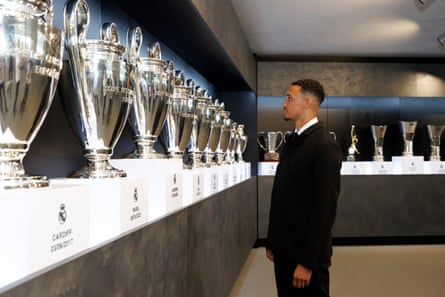The owner
The whole system is lubricated by agents: how they work and how they make things work. At my club, we have closed the door to that now. We used to say we were open to what agents sent our way but in our experience only around one in 100 suggestions were useful, let alone successful.
When we are recruiting, I’ll be involved in selecting the top targets and will send a list to the sporting director. He will look at the balance of the squad; factors like age, leadership and nationality, and see what makes sense to him. Then I’ll set a budget including the fee, salary, the expected terms from the agent and selling club, and we’ll take it from there.
Sometimes you’re miles out and the other owner simply won’t sell. So you move on. When we’re selling a player we don’t want to lose, we negotiate depending on the interested club. There’s no point setting a fixed fee and then seeing one of the wealthiest clubs come in. You try to find a deal if the player wants to go, because you don’t want to cause unhappiness in the squad.
For me, the worst period of a transfer deal is the time between everything being agreed and the medical. Our club will never change the terms once a deal has been agreed, but the other party could do. I always try to ensure the shortest possible time between the agreement and the medical, so that nobody else can come in. Similarities with buying a property haven’t disappeared yet.
The scout
These days, the scout is usually the second port of call in regards to transfers. Increasingly, the identification stage is being carried out by the data team at a lot of clubs, which is a big development in recent years.
One of the big areas where a scout can still contribute is assessing potential and deciding which player is the best fit for your particular club. That is very important because the data may be only talking about the current performance level, rather than anything more incisive into the future, or anything more specific to your particular set of circumstances. We are also increasingly involved in background checks, such as looking into a player’s personality off the pitch – if you are the one who is out and about at games, bumping into agents, bumping into people from other clubs, then you should have the connections to be able to do that.
Once you’ve made your recommendations, it’s more of a circular process between different departments. The scout chips in with their opinion, as well as liaising with agents and getting information around the player. First of all, you need to make sure it’s realistic and affordable and it’s within the parameters that we can act upon. Otherwise, the most senior guys are going to be wasting too much of their time on things that aren’t going to come off.
The agent
People think an agent just bowls into a boardroom and does a deal, but I spend only 2% of my time – if that – in contract negotiations. The job is pretty much all about developing and supporting. It could be managing PR, lifestyle, relationships, finance and investments. Also emotional needs and physical support. Numerous elements make up high performance and a transfer is just a consequence.
When they do happen, managing the expectation of my client is probably the hardest thing. I’m also constantly putting out fires on pipe dreams where budgets don’t align: clubs might ring and say they want to sign such and such and they have got a Mars bar and a button. It’s like: ‘That’s not going to happen.’
It will be the head of recruitment who typically gets in touch. That person might say where the player fits in on their list and, if things move forward, the next contact would be a technical director or chief executive. You discuss terms and, if everyone’s happy, they’ll bid – with guidance on the number from the agent. Normally that will get knocked back, and get knocked back again. Where it gets messy is if another club or clubs come in.
The player’s head is all over the place because they’ve got managers and other players calling them. Then it breaks in the press and you’re managing something that’s just insane. If you can get it close to the end as quietly as possible, it saves you such a headache.
The player
You usually find out about a potential transfer a long time before it actually happens. Before a club put an offer forward, they have discussed it with the agent and indirectly with the player. Then the player will say to the agent: ‘Yeah, I’m interested in a move.’
For a player it’s always good to know that the coach of an interested club likes me, he admires me, sees me as a guy that can make a difference. It’s a compliment . Then as a player you say to your club: ‘I’m aware of this interest. They’ve made it official now.’ What are their thoughts? Would they be interested in doing business with them?
A lot depends on if a player is on a final-year contract. He’s not sure of his future. He then starts talking with his club, saying: ‘What long-term plans do you have for me? Am I still in your plans? Or you will be replacing me at the end of the season? Or are we talking to extend my stay at the club?’ So players are not in control of their destinies a lot of times.
As a player you have to always be ready to change countries, change leagues, change cities. Football comes first, always, because the career is short – you have to take your opportunities.
The head of player care
We were told the prospective new signing had young kids who adored the movie Frozen. We also knew he had been over by himself for a visit and had not been taken by the area or any of it, really. He was wavering. So the club asked me and my team whether we could resurrect it.
Our work often starts before the transfer, selling the idea of life away from the pitch. Houses, schools, restaurants, flights back to the player’s home country. With the player in question, we brought his family over. We took them to see houses that were within their budget. And we wandered around central London with an actor dressed up as Elsa (📷) from Frozen, who we had paid £200. By the end of day two, the family were saying: ‘We’re home.’ The player signed.
Another part of it is coordinating the signing day. That’s booking the flight in, whether it’s commercial or private. Getting the player to the hotel, making sure he’s not seen. There’s security. Some clubs like to use decoy cars from the airport to throw waiting media off the scent. It’s also guiding the player through the medical, providing translation services, itinerary building that takes in media and comms.
The player-care team will see the player five times a day for the first couple of weeks, sorting out the building blocks of life: house, car, bank account, visa, phone, schools. And then the role changes to more of a support mechanism, so it’ll be once or twice a day.









